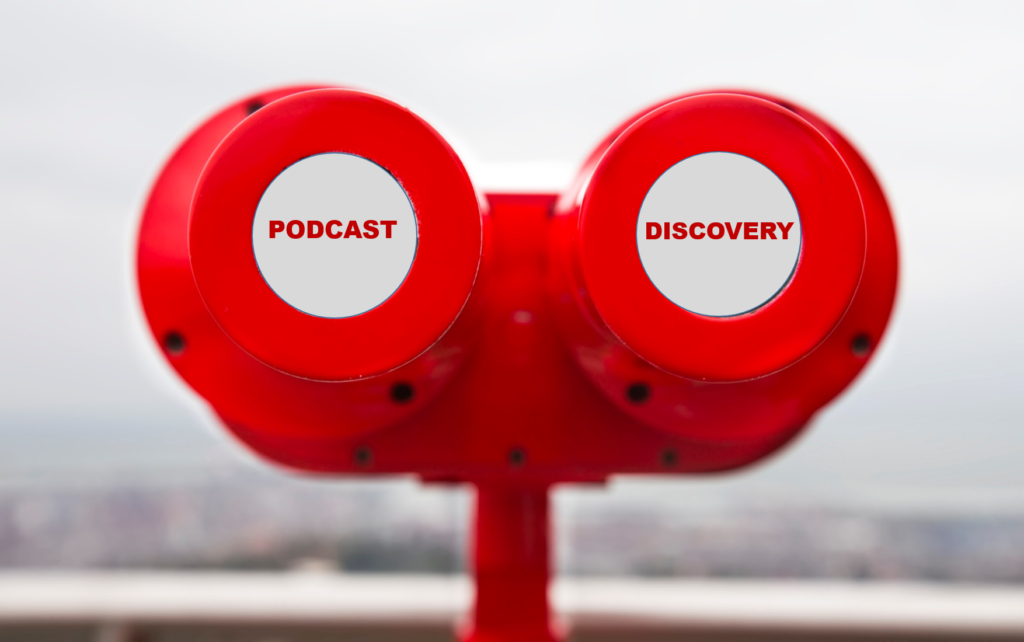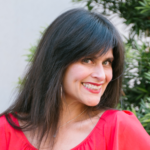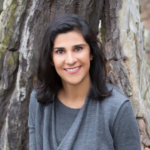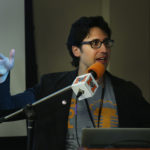
Since joining Jacobs Media 2½ years ago, Seth Resler has made his mark on our company. His passion – as many know – is podcasting. He’s been producing podcasts for many years, and has a hot new project “The D Brief” – a show that’s all about arts, culture, entertainment, and sports here in the Motor City. And now he’s experiencing some of the same speed bumps that all podcasters face – how to get discovered.
And it turns out that today is a big day in the world of podcasting. Apple’s long-awaited analytics package has been release, promising to redefine the ways in which podcast creators and advertisers view the space. And that will make “discoverability” an even more important issues.
Former head of NPR programming and current content driver for Audible, Eric Nuzum (he’s quoted below), often refers to the plethora of podcasts in the wild as a flea market – it takes a lot of  hunting and sifting to find the program you really like.
hunting and sifting to find the program you really like.
So, in that spirit, Seth set out to find out if podcast discoverability is, in fact, the problem so many say it is. It’s a great read. -FJ
With hundreds of thousands of podcasts out there, it can be hard for an up-and-coming podcaster to break through. Ask many of them, and they’ll complain that podcasting has a “discoverability” issue; in other words, it’s hard for podcast listeners to find shows that match their interests.
But is that really true? Or is awareness and discovery a challenge for podcasters, and not podcast listeners?
I reached out to a some of the best and brightest in the podcasting space to ask their opinions. The question was simple: I asked them to react to this statement:
“Podcasts have a discoverability problem.”
Here’s what they said…
 In some ways, discoverability in podcasting is more accessible and more egalitarian than in most other media. The difference is that in television and other high-cost media, if you can afford to produce content, you can probably afford to market that content. In podcasting, the barrier to entry is lower and many content creators don’t have the resources to build their own audiences. Instead they are relying more heavily on platforms for discovery — both of their content and podcasts in general.
In some ways, discoverability in podcasting is more accessible and more egalitarian than in most other media. The difference is that in television and other high-cost media, if you can afford to produce content, you can probably afford to market that content. In podcasting, the barrier to entry is lower and many content creators don’t have the resources to build their own audiences. Instead they are relying more heavily on platforms for discovery — both of their content and podcasts in general.
NPR One is working to tackle two major discoverability challenges for podcasts. First, we are bringing new listeners into the podcast audience by putting a curated selection of podcasts alongside our news content. Listeners who come to our platform to hear the latest news story from All Things Considered will also hear podcasts to which they might not otherwise be exposed. Second, we’re serving listeners content they value by constantly refining the ways we deliver podcasts. We’re experimenting with ideas like email notifications about new podcasts that reach audiences based on their previous listening behaviors. We’re learning more every day about how listeners consume podcasts and we’re putting those lessons to work.
Emily Barocas
Podcast Lead
NPR One
 No, they don’t. I’m a podcast listener, as well as a podcaster, and I don’t search for new podcasts. If I’m going to spend my limited time trying a new podcast, it’s because someone whose judgment I trust told me that I’d like it. In my experience, most avid podcast consumers have more podcasts on their download list than they have time to listen to them; this means that even if the perfect directory were invented, it wouldn’t be widely used.
No, they don’t. I’m a podcast listener, as well as a podcaster, and I don’t search for new podcasts. If I’m going to spend my limited time trying a new podcast, it’s because someone whose judgment I trust told me that I’d like it. In my experience, most avid podcast consumers have more podcasts on their download list than they have time to listen to them; this means that even if the perfect directory were invented, it wouldn’t be widely used.
The truth is that the only podcasts that have discoverability problems are the ones that are failing to inspire their audience members to recommend their episodes to friends. As a non-celebrity that has built a dedicated following starting from zero listeners, I can testify that independent podcasters can find an audience if they spend their time creating unique, informative, entertaining content. Anyone who says otherwise is just whining.
Jennifer Briney
Executive Producer & Host
Congressional Dish podcast
 Like any new medium, discoverability is always a challenge. In the early days of television, TV shows had a huge discoverability problem because the only people who could discover a show were people with TV sets. With podcasting, the problem is similar. While most people have the technology to listen to a podcast, we know the majority of people still don’t know how to use it or care enough to want to learn how to listen to a podcast.
Like any new medium, discoverability is always a challenge. In the early days of television, TV shows had a huge discoverability problem because the only people who could discover a show were people with TV sets. With podcasting, the problem is similar. While most people have the technology to listen to a podcast, we know the majority of people still don’t know how to use it or care enough to want to learn how to listen to a podcast.
Consequently, (at least for now) it seems to make the most sense to make your podcast as visible as possible INSIDE the podcast universe. By making your podcast discoverable primarily to people who already listen to other podcasts you are preaching to the choir – and not wasting time and effort on people who aren’t part of the podcast world – yet.
Mike Carruthers
Host
Something You Should Know
 I’ve been podcasting since 2009. Most of my listeners know about my podcast – Shannon Cason’s Homemade Stories – because they’ve heard me on other popular shows like The Moth and Snap Judgment. When people hear my content and eventually find my show, they become very loyal listeners. I get the messages saying they’ve been looking for a show like mine for some time and were happy to finally find it. There should be an easier way for listeners to seek out the type of podcast content they want to hear and not just have to settle for what is easiest to click.
I’ve been podcasting since 2009. Most of my listeners know about my podcast – Shannon Cason’s Homemade Stories – because they’ve heard me on other popular shows like The Moth and Snap Judgment. When people hear my content and eventually find my show, they become very loyal listeners. I get the messages saying they’ve been looking for a show like mine for some time and were happy to finally find it. There should be an easier way for listeners to seek out the type of podcast content they want to hear and not just have to settle for what is easiest to click.
Shannon Cason
Executive Producer and Host
Shannon Cason’s Homemade Stories
(Photo by Justin Milhouse)
 Podcasts having a discoverability problem is honestly a myth. You can Google any of the five shows that I produce and they will be at the top of near the top of the Google search results. Podcasters need to realize there is more involved in podcasting than recording a show and publishing it. You have podcasts that have built their shows on platforms that do more to build their hosting companies brand than their own.
Podcasts having a discoverability problem is honestly a myth. You can Google any of the five shows that I produce and they will be at the top of near the top of the Google search results. Podcasters need to realize there is more involved in podcasting than recording a show and publishing it. You have podcasts that have built their shows on platforms that do more to build their hosting companies brand than their own.
You have podcasters who have released episodes of their shows with one sentence of show notes. You can have the best podcast in the world but we still publish on the digital web, and all the rules about the digital web apply. Podcasters that have their own domain, website, and control and build their brand with dynamic written content in addition to their podcasts have an incredibly higher percentage of being discovered.
Word of mouth remains the #1 way podcast are discovered. Second is Web Searches. But yet when people do find a show on the web many times they are only promoting Apple Podcasts. Most podcasters have ignored the other 50% of users on Android. That is why on all my sites there is one-click Subscribe on Android link prominent on my website.
Promoting and building a show following is real work. I recently spent an hour talking about social strategies I used that podcasters can use to build an audience during International Podcast Day the advice in this video is a proven strategy I have used over thirteen years to have a massive show that allows me to be a full-time podcaster.
Todd Cochrane
CEO
Raw Voice / Blubrry
 Yes, podcasts have a discoverability problem, to a degree. Podcast networks appear to be the best way round that, though there’s good work being done by some tech companies, notably Castbox and RadioPublic.
Yes, podcasts have a discoverability problem, to a degree. Podcast networks appear to be the best way round that, though there’s good work being done by some tech companies, notably Castbox and RadioPublic.
The bigger problem podcasts have is that the majority of people who podcast only listen to 2 podcasts a week. The question is whether it’s possible for this to be significantly grown. Discoverabiity is one thing, but available eartime is quite another.
James Cridland
Publisher, futurologist
podnews.net
 What I would change the statement to is: podcasting has an advocacy problem.
What I would change the statement to is: podcasting has an advocacy problem.
The future and growth of podcasting are often discussed by the podcasting industry and public media around data that solely focuses on advertising, monetization and podcast download/listener metrics. The problems to be solved are heavily biased toward the discovery problem and the so-called wild west of podcast metrics measurement and almost exclusively from the producer, creator side of things.
Issues that the industry has not addressed are how socioeconomics and cognitive behavior impact the reality of podcast growth from the listener perspective, regardless of new discovery and measurement tools.
If we don’t, as an industry, pay attention to how higher or lower levels of economic freedom, infrastructure, and cyber behavior affect the listener, we will miss an imperative and impactful opportunity to amplify diverse voices plus listeners as well as solidify podcasting’s ability to reach the widest audiences.
It’s time for podcasters but more importantly, podcast companies that are getting the millions of dollars to invest in creating programs that focus on education and outreach to underrepresented communities building on current consumption habits and advocating for new ones.
They won’t come to play in our sandbox. We need to go play in theirs.
Elsie Escobar
Community Manager, Libsyn
Co-founder, She Podcasts
 I don’t have a problem discovering new podcasts. If I’m looking for something specific, keyword searching gets me there; and I hear about new podcasts every day. The shows I listen to now are almost completely different from the shows I listened to a couple of years ago, and I try new shows all the time.
I don’t have a problem discovering new podcasts. If I’m looking for something specific, keyword searching gets me there; and I hear about new podcasts every day. The shows I listen to now are almost completely different from the shows I listened to a couple of years ago, and I try new shows all the time.
The “discovery” problem with podcasts is the same “discovery” problem with books: there are far more podcasts and books than listeners and readers with time to consume them. I’ve never heard someone say, “I’ve run out of great podcasts, and I can’t find anything new to listen to,” but I have heard people say, “I can’t keep up with all the great podcasts in my feed.” Bringing more new listeners into the market and making it easier to listen in the car would do more for podcasters than any attempt to improve discoverability.
Mignon Fogarty
Host, Grammar Girl podcast
Founder, Quick and Dirty Tips

I feel like the problem is less about the discovery of individual podcasts, and more about discovery (and understanding) of podcasts as a whole. Rarely do I hear people who are seasoned podcast listeners complain about not being able to find anything they like to listen to. On the contrary, I often hear of listeners saying there are more shows they want to listen to, than time they have for listening!
I think the industry as a whole should be just as focused on becoming more mainstream in terms of awareness, and making it easier for new listeners to actually listen. We’ve all told a friend or family member about a new podcast we think they’d like, and more times than not it’s followed up with the question of how to listen. Once we get a lot more people listening to podcasts as a whole, I think we’ll be pleasantly surprised when the “disoverability problem” fixes itself.
Dan Franks
Co-Founder/Organizer
Podcast Movement
 One could argue that just about any media content has discoverability issues these days. There are hidden treasures all over the place – whether it be cable, on the web, in a bookstore, on the radio and yes podcasts. I am constantly amazed at how many new shows are on Netflix and I can’t possibly get to them all. And some Netflix shows are canceled because they don’t have enough audience, and they have 120 million subscribers. Sure, some of the shows might not have been good, but many perish because they weren’t discovered. So yes, of course there is a discovery issue with podcasts. There are some 400,000 podcasts and many will never be easily found because they don’t have the megaphone of broadcast or social media or word of mouth behind them.
One could argue that just about any media content has discoverability issues these days. There are hidden treasures all over the place – whether it be cable, on the web, in a bookstore, on the radio and yes podcasts. I am constantly amazed at how many new shows are on Netflix and I can’t possibly get to them all. And some Netflix shows are canceled because they don’t have enough audience, and they have 120 million subscribers. Sure, some of the shows might not have been good, but many perish because they weren’t discovered. So yes, of course there is a discovery issue with podcasts. There are some 400,000 podcasts and many will never be easily found because they don’t have the megaphone of broadcast or social media or word of mouth behind them.
 This continued complaining that podcasts have a discovery problem is being driven by many podcasters who are wanting to grow audience faster. Growth like that can be achieved by doing some basic things that are fundamental to online marketing practices that includes inspiring word of mouth sharing.
This continued complaining that podcasts have a discovery problem is being driven by many podcasters who are wanting to grow audience faster. Growth like that can be achieved by doing some basic things that are fundamental to online marketing practices that includes inspiring word of mouth sharing.
Many podcasters simplistically think that if their show can be magically featured or promoted at existing and new start-up audio companies and available in audio search more, then they will reach more audience and make more money. While this goal is good and fine, the real question being asked is how do we grow the overall audience for all podcasts faster.
The question should be how we grow the overall listener base for podcasting to maintain audience growth that matches the escalating number of new podcasts being launched in the market every month? To date the growth of podcast audience has been relatively slow over the past 13 years. Growth of word of mouth sharing of podcasts has been steady and been driven by increasing quality of content, expansion into new content genres and growing media coverage.
As we look forward we need to partner with our radio colleagues to transition audio audiences to the inevitable move to on demand audio listening in digital platforms. Then encourage Google Android to do a much better job of presenting podcasting content to its millions of mobile smartphone users.
Rob Greenlee
Head of Partnerships
Spreaker and BlogTalkRadio
 I absolutely agree. The best thing about the podcasting industry is that it has exploded, and the worst thing about this is….well that the industry has exploded! There are a heck of a lot of podcasts out there to choose from but how do you brave through the jungle to discover the good stuff that’s out there? When it comes to the tried and tested material, This American Life, The Daily or pretty much anything from Gimlet, no help is needed but with the other lesser known shows, it’s a challenge.
I absolutely agree. The best thing about the podcasting industry is that it has exploded, and the worst thing about this is….well that the industry has exploded! There are a heck of a lot of podcasts out there to choose from but how do you brave through the jungle to discover the good stuff that’s out there? When it comes to the tried and tested material, This American Life, The Daily or pretty much anything from Gimlet, no help is needed but with the other lesser known shows, it’s a challenge.
Podcasts are much like the book publishing industry. At one time, we trusted top-quality publishers. We still do to a point, but they’re now in a space filled with self-published books from anyone who thinks they’re a writer. That’s happening with podcasting. On one hand, it’s not entirely a bad thing, but on the other hand, the bad-quality stuff makes it harder to find the good-quality stuff. That’s where companies like Otto Radio add value – through immersive recommendation techniques and curated collections.
Reenita M. Hora
VP of Content
Otto Radio
 I believe podcasts do have a discoverability problem. Westwood One is consistently assessing creative and impactful ways to engage potential listeners via radio promotion, social media and the podcast host’s channels but there is no perfect science…yet. Everything from show artwork to social reach to impactful/engaging content is critical to the success of a new show…but even if all of the ingredients are there for a successful show…it doesn’t always take off out of the gate.
I believe podcasts do have a discoverability problem. Westwood One is consistently assessing creative and impactful ways to engage potential listeners via radio promotion, social media and the podcast host’s channels but there is no perfect science…yet. Everything from show artwork to social reach to impactful/engaging content is critical to the success of a new show…but even if all of the ingredients are there for a successful show…it doesn’t always take off out of the gate.
My communication with podcasters is that this needs to be a passion project first and foremost. It may take time to build an audience, gain their trust and keep them coming back for more. I believe radio will play a big role in helping podcast discoverability and I’m excited to be a part of how that strategy unfolds.”
Kelli Hurley
VP Digital Sales
Westwood One
 Discoverability is not the problem. You can discover podcasts on any subject you want. Go to any podcast app, type a subject in the search, and press enter. Boom! Discovery solved. There is also Google. Type the subject you are looking for and add the word “podcast” and you will get results.
Discoverability is not the problem. You can discover podcasts on any subject you want. Go to any podcast app, type a subject in the search, and press enter. Boom! Discovery solved. There is also Google. Type the subject you are looking for and add the word “podcast” and you will get results.
The people that say there is a discoverability problem are saying that because their show is not coming up in the search results. My guess is they have four episodes published, their show is poorly named, and they have an “If I record it they will come” mentality. Directories like the Apple Podcasts App are like giant digital phone books (except they are podcasts instead of phone numbers). When people expect to get popular/famous/rich from being in Apple Podcasts that is like saying I’m going to be famous because I’m in the phone book.
Discovering quality podcasts that deliver value, THAT is the problem. Yes, podcasting has “no rules,” but putting a single microphone in the middle of a table while you and your three friends laugh about inside jokes from 10 years ago does nothing for your audience.
Most of the shows I listen to are created by people I’ve met in person, heard on other podcasts, or referred to by friends.
I can see where people feel there is a problem. Topics like real estate, fantasy football, entrepreneurs, etc, have a ton of podcasts. If an app only shows 100 results and there are 200 podcasts available on that subject 100 people feel there is a discoverability problem. According to Apple, there are 400,000 podcasts in Apple Podcasts with 1000 more being added every week. To the app developers, that’s like being fed with a firehose.
I would love to see any energy that is going to be put into solving the “Discovery problem” put into publicity about how to subscribe to a podcast, and explaining what one is. Everyone knows what an Amazon Echo is due to publicity through commercials. There are no commercials for podcasts to inspire people to go look for one, and I don’t expect there ever will be. Podcasts are free, commercials aren’t.
Dave Jackson
Podcast Consultant, Speaker, Author
School of Podcasting
 Yes, there is a “discoverability problem” in podcasting, just as with anything else, whether that’s your web site, blog, product, or service. But the issue is exponentially magnified in podcasting for a few different reasons:
Yes, there is a “discoverability problem” in podcasting, just as with anything else, whether that’s your web site, blog, product, or service. But the issue is exponentially magnified in podcasting for a few different reasons:
1) The indexing of audio content is still practically non-existent. It is not possible right now to search for and find podcasts where a topic or keyword was mentioned in an episode. That means you have to rely on text-based show-notes and transcriptions of your audio on your web site, and then use Google to find your page that has the show-notes, and then click on the audio player on that page, if you have one). So using Google to find a web site that then leads to a podcast on Apple Podcasts or other directories, is an extremely convoluted way of searching, which is not helping.
2) The Apple Podcasts app has a horrendous search engine with extremely limited search capabilities. It doesn’t even search your episode description. To make matters worse, a lot of podcast apps mirror the Apple Podcasts catalog, and are equally bad at search themselves.
So podcasters currently get no help with finding new listeners through organic searches, and have to rely on word-of-mouth recommendations from listeners, and we’re not yet at the point where people are recommending podcasts on their Facebook or Twitter accounts. Google is the only one that can solve this search issue, but they don’t even have a native podcast app for Android yet. But hopefully, all of this will improve sooner than later, and all we can do as podcasters right now is to use every creative trick and strategy there is to promote our own shows, whether that’s through social media, paid advertising, cross promotions, being a guest on other shows, and most importantly, building an email list.
Ravi Jayagopal
Host of the SubscribeMe Podcast
 While podcasters think they have a discovery problem, “podcast discovery” is actually a mythical problem because it doesn’t affect the consumers. As with all other forms of marketing, there isn’t a Field of Dreams “If you build it, he will come” solution. What podcasters need is not what consumers need. Consumers need a simple and understandable process for getting podcasts, not a discovery tool. The question most consumers ask is not, “Where can I get a podcast?” It’s “How do I get a podcast” or even “What is a podcast?” Solving those issues require proactive outreach and process simplification, not passive discovery.
While podcasters think they have a discovery problem, “podcast discovery” is actually a mythical problem because it doesn’t affect the consumers. As with all other forms of marketing, there isn’t a Field of Dreams “If you build it, he will come” solution. What podcasters need is not what consumers need. Consumers need a simple and understandable process for getting podcasts, not a discovery tool. The question most consumers ask is not, “Where can I get a podcast?” It’s “How do I get a podcast” or even “What is a podcast?” Solving those issues require proactive outreach and process simplification, not passive discovery.
Ironically, nearly everyone who is trying to solve the mythical problem of “podcast discovery” is making a third-party app or tool that has to be discovered!
Someone relying on “podcast discovery” to grow their own audience is taking a lazy, responsibility-shifting approach to marketing.
Daniel J. Lewis
Speaker, Consultant, and Host
The Audacity to Podcast™
 Sure, podcasts have a discoverability problem but it’s no different than other media where there is an enormous body of content. The problem is, there are so many good podcasts out there it’s hard to get yours to stand out in the crowd. Admittedly, the level of effort that has been put into discovery tools such as search, recommendations and personalization has been much lower as an industry than in media like music, video, text. This is changing, but is significantly behind these other media types.
Sure, podcasts have a discoverability problem but it’s no different than other media where there is an enormous body of content. The problem is, there are so many good podcasts out there it’s hard to get yours to stand out in the crowd. Admittedly, the level of effort that has been put into discovery tools such as search, recommendations and personalization has been much lower as an industry than in media like music, video, text. This is changing, but is significantly behind these other media types.
The industry, as a whole, needs to do a better job of promoting content to get more listeners hooked with things like short form trailers, best of segments, etc. Long form continues to be a barrier for new listeners (high commitment to try the content) that needs to be reduced.
Rob McCracken
Director, Digital Solutions Group
Scripps Media, Inc.

I agree that podcast discovery is a problem, but I think it’s a bit of a red herring. There is a massive gap between awareness of podcasting (60% of adults) and actual habituated consumption to podcasting (24% of adults)—a much gap than in other mediums. While some of that can be attributed to the wretched discovery experience, there is a bigger problem: the content itself.
While there are currently more than 400,000 different shows in the podcast ecosystem, there is a surprising lack of diversity. And by diversity, I mean that podcasts tend to sound like other podcasts. While there’s a lot of stellar talent and terrific stories—there is not a lot of diversity in appeal. For podcasting to break through to more ubiquitous use, it needs to create more different types of listening experiences targeted at a broader range of people. Not just more of the same.
Fixing the discovery mechanisms—and the horrible user experience of podcasting apps in general–is important work, but you have to create something that brings people back again and again. And for ¾ of adults, we aren’t doing that yet.
Eric Nuzum
SVP, Original Content Development
Audible
 In some ways, podcasts have a discoverability problem. It seems many listeners discover shows through word of mouth. Larger shows of course can advertise and use other paid media to get the word out. Smaller shows have a more difficult time cutting through the clutter. Most of the clients I consult with are corporate entities who are able to reach their audiences through their regular communications channels, and their audiences have a vested interest in consuming their content. So for them, discoverability is not an issue.
In some ways, podcasts have a discoverability problem. It seems many listeners discover shows through word of mouth. Larger shows of course can advertise and use other paid media to get the word out. Smaller shows have a more difficult time cutting through the clutter. Most of the clients I consult with are corporate entities who are able to reach their audiences through their regular communications channels, and their audiences have a vested interest in consuming their content. So for them, discoverability is not an issue.
As podcasting continues to grow in popularity, we’ll have more shows out there for sure. It takes time, but shows do find their audiences. Eventually.
Donna Papacosta
Principal, Trafalgar Communications
Co-author of The Business of Podcasting
 If you’re a podcast listener… podcasts don’t have a discoverability problem. The podcast community does a great job of telling other podcast listeners what is new and what is the next big thing in podcast listening – that’s why once someone starts listening to podcasts, they usually listen to a lot of them! For the majority of Americans that do not listen to podcasts on a regular basis, there are hurdles to overcome, including how to even start listening to podcasts.
If you’re a podcast listener… podcasts don’t have a discoverability problem. The podcast community does a great job of telling other podcast listeners what is new and what is the next big thing in podcast listening – that’s why once someone starts listening to podcasts, they usually listen to a lot of them! For the majority of Americans that do not listen to podcasts on a regular basis, there are hurdles to overcome, including how to even start listening to podcasts.
At iHeartRadio, we’ve taken steps to enhance podcast discoverability for our millions of listeners by rolling out a new podcast directory that keeps first-time podcast listeners in mind and surfaces the best personalities and content in the podcast space, making it more likely for them to push play on their first podcast episode. We also have popular iHeartRadio talent like Elvis Duran and Bobby Bones talking about podcasts on air, which exposes millions of more new listeners to the podcast world.
Chris Peterson
Senior Vice President, Podcasting
iHeartRadio
 I don’t always believe the argument I’m about to make, but today I do. I kind of like that podcasts have a discoverability problem. I love how podcasting is an archipelago of hidden islands. Secret treasures are the best kind; at least they are to those who’ve found them. My whole life I’ve been attracted to underground scenes, and podcasting is no different. I’d always rather be a member of a basement-sized audience than an arena-sized audience, and as a creator I think I generally prefer to play for the basements as well. Being that I derive most of my income from teaching rather than podcasting, this is a privileged position for me to hold, and I will own that fact.
I don’t always believe the argument I’m about to make, but today I do. I kind of like that podcasts have a discoverability problem. I love how podcasting is an archipelago of hidden islands. Secret treasures are the best kind; at least they are to those who’ve found them. My whole life I’ve been attracted to underground scenes, and podcasting is no different. I’d always rather be a member of a basement-sized audience than an arena-sized audience, and as a creator I think I generally prefer to play for the basements as well. Being that I derive most of my income from teaching rather than podcasting, this is a privileged position for me to hold, and I will own that fact.
I don’t think that many people need to be professional podcasters in order for us to have a thriving podcasting scene. As a listener, I’m not really interested in hearing professionals very often anymore. I like the work of enthusiastic, semi-skilled amateurs, and I’m willing to dig through the dusty record store bins of the internet to find them. If I’m honest, part of me hopes you don’t find them—because if they get popular, they’ll never be the same.
Adam Ragusea
Journalist in residence at Mercer University
Founding Host of The Pub podcast
(Photo by Laura Fong / Mercer University)
 “It’s a phrase oft repeated by those that do not understand podcasting or talk directly to individual Podcasters. There is no podcast discoverability problem, but there is the “My podcast has not been discovered yet” problem. If you look at the most popular 3rd party podcast apps they are not and never have been ones that focus on discoverability but rather they focus on making it easy to play the content the end users already know they want to play.
“It’s a phrase oft repeated by those that do not understand podcasting or talk directly to individual Podcasters. There is no podcast discoverability problem, but there is the “My podcast has not been discovered yet” problem. If you look at the most popular 3rd party podcast apps they are not and never have been ones that focus on discoverability but rather they focus on making it easy to play the content the end users already know they want to play.
The shows that are the biggest in iTunes will for the most part tell you the same thing when it came to growing their audience: they did not do anything special – they just created great content and their audience spread the word. Podcasting is a lot like movies where word of mouth is what determines a success not some solution to the mythical podcast discoverability issue. Any one saying there is a discoverability issue in podcasting just does not understand the space.”
Rob Walch
VP Podcaster Relations
Libsyn

Podcasts don’t have a discoverability problem. That’s a ‘pull’ strategy—hoping there are loads of people looking for new podcasts that just can’t find your content. I don’t believe there are hordes of people out there who are actively looking for podcasts but are being thwarted by poor discovery. Google works just fine for that, last I checked.
The real issue—and opportunity—is a much broader marketing challenge: most people aren’t listening to podcasts at all, either because they don’t know what they are, or they haven’t been given a strong enough reason to. Before we start worrying about ‘pull’ issues like discovery, the medium needs a ‘push’: a concerted effort from the industry to bring mainstream content to the general public AND to explain what a podcast is and why we should care.
Tom Webster
VP of Strategy and Marketing
Edison Media Research
 The ease of discoverability (and surely the industry can come up with a better term than that clunker, but here we are!) can vary quite a bit. For members of specific subcultures, whether it’s romance novel readers or real estate investors or woodworkers, finding podcasts is pretty easy because those communities are lively and have a lot of online forums to share information.
The ease of discoverability (and surely the industry can come up with a better term than that clunker, but here we are!) can vary quite a bit. For members of specific subcultures, whether it’s romance novel readers or real estate investors or woodworkers, finding podcasts is pretty easy because those communities are lively and have a lot of online forums to share information.
But for someone who’s completely new to podcasts, or someone who doesn’t know what kind of show they want to listen to, there’s not a great way to learn about or sample shows from across the wide range of podcasts out there. Both newsletters and lists of recommended podcasts in mainstream publications tend to default back to the blockbuster shows or new programs from established podcast networks and producers. And the broad categories on Apple Podcasts or podcast apps only get you so far because people seek out shows for all sorts of reasons that have nothing to do with a show’s nominal subject matter—they want to be entertained; they want to go an emotional journey; they want to understand current events; they want practical life advice. My ideal recommendation engine would not only suggest lesser-known shows, but somehow account for the kind of experience I’m looking to get out of a podcast.
Wailin Wong
Co-producer/Host
Rework podcast
Listen to The D Brief Podcast
I have launched a new podcast about the Detroit arts and entertainment scene that aims to apply the principles of commercial radio to a podcast. Please check it out.
Guide to Podcasting
If your radio station is looking to start podcasting, check out our Podcasting Guide for Radio Stations.
Join us at Podcast Movement
We’ll once again be anchoring a special track at the world’s biggest podcast conference, “Broadcasters Meet Podcasters.’ For more info on Podcast Movement, July 23-26 in Philadelphia, it’s here.
- A Simple Digital Treat to Thank Your Radio Listeners This Thanksgiving - November 13, 2023
- Interview Questions When Hiring Your Radio Station’s Next Digital Marketing Manager - November 6, 2023
- A Radio Conversation with ChatGPT: Part 2 – Promotions - October 30, 2023




Great column with tons of insights I can relate to and ideas I can explore.
Thanks for that, Jim. It really came together nicely.
There seems to be a lot of great content, a platform mismatch and a finite level of interest.
There is a consensus that finding podcasts on a given subject is easy. As Steve Goldstein pointed out, discovery is an issue with all media these days. But too many can’t be accessed easily without iTunes, leaving Android users in the cold. Fixing that is probably the easiest way to increase podcast listening.
Last, but certainly not least, there is only so much interest in and available time for spoken word programming. As a result, this sector can only grow so much.
I’m not disagreeing, Bob, there are limits. But the other piece of this is the on-demand attribute – the ability to listen to what we want when we want it. I have an aunt and uncle that still stay up to watch the 11 o’clock news. When I tell them about Netflix and on-demand, they just can’t process it. The podasting numbers overall are OK, but far from great. But when you drill down into Millennials, you can see the future. More and more (even as we saw in Alabam), they are becoming more influential every year. Their attachment to podcasts could drive this platform. Appreciate the comment.